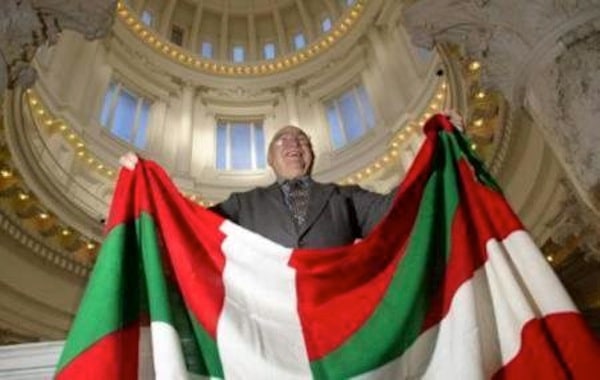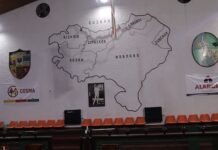As promised, here we offer a joint statement from several blogs on both sides of the Atlantic about the opinions given by Mr. Javier Rupérez in the Spanish monarchical daily ‘ABC’ about Pete Cenarrusa just a few days after his death.
A few days ago, quite sadly, we were informed of the passing of Peter Censarrusa, one of the most influential Basque-Americans in Idaho. Not long after, Spanish newspaper ABC published an article written by the former Spanish ambassador to the United States, Javier Rupérez, in which he more or less compared favoring independence to being a terrorist, a very tired argument, indeed.
We do not know Mr. Rupérez. But neither does he know the Basques, and certainly not Pete. And we believe it is cowardly to stab a man who’s just died in the back. Some of us had the honor of meeting this great Basque-American at some point in our lives, and others didn’t. However, we all wanted to reflect on Pete’s significant contribution to the preservation of the Basque identity inside the Basque Country and out (here are the personal opinions of About the Basque Country and Bieter Blog). The four blogs that have signed this entry (A Basque in Boise, About Basque Country, Basque Identity 2.0 y Bieter Blog) could not just stand by and let the defamation of Mr. Rupérez against Pete Cenarrusa stand.
PETE CENARRUSA (1917-2013)
IDAHO RANCHER, BASQUE SEPARATIST
Deceased at 96, Cenarrusa – which was the way he had shortened his paternal surname Zenarruzabeita – had the leading role in Idaho’s political and social scene for almost six decades, being elected several times to the local legislature and carrying out for years the role of Secretary of State in the rustic territory. His parents emigrated from the Basque Country to the United States at the beginning of the 20th century, as many of their compatriots did in those days, in response to the call for sheepherders to run the significant number of livestock in the American West.
From early on, conscious of his Basque origins, he tried to promote individual and collective memories in the environment of his countrymen, an activity that took a noticeable nationalist tone in the 1960s. He wasn’t awarded the prize “Sabino Arana” to the “universal Basque” by the Basque Nationalist Party for nothing.
It was in 2002 when these nationalist inclinations took shape in the attempt to make the Idaho legislature adopt a memorial that ignored ETA’s terrorist activities, demanded a favorable disposition from Spain and France to negotiate “the end of the conflict,” and asked for the self-determination of the Basque Country. Cenarrusa was the inspirer and visible leader of the attempt, for which he had the support of Ibarreche’s Basque government and Batasuna’s contacts incarnated in journalists for “Gara” and “Egunkaria”, regular visitors of the land where they received the hospitality of then local legislator and now mayor of Boise, Idaho’s capital, David Bieter.
The government of Jose Maria Aznar warned George W. Bush’s White House about the maneuver, and made Idaho legislators realize the inconvenience of adopting texts which were offensive to a friend and allied country such as Spain. The spokesman for the Department of State made a strong statement during those days that said, among other things: “The Spanish people suffer the violence carried out by a terrorist organization called ETA on a regular basis.” Exactly what the memo Cenarrusa/Bieter/Ibarreche/ Gara/Egunkaria did not want to gather. And that to the dismay of its sponsors ended up written in the amended text, which was eventually approved by the Idaho legislature.
It was in January 2003 when Idaho’s Senate president had the opportunity to communicate to the representatives of the Spanish government his regret for what happened, blaming it on the extreme ignorance by local representatives about Spanish affairs and the generalized willingness to please Cenarrusa in the last initiative he took on before retiring from his role as Secretary of State. Robert L. Geddes had begged the veteran rancher and politician of Basque origins that “the next time he wanted to declare war on Spain he give him prior notice to avoid misunderstandings.” On that same occasion Idaho’s Senate made the Spanish ambassador in Washington honorary citizen of the State. And Spain officially named Adelia Garro Simplot, another Basque descendant, honorary consul in the area. Garro is the abbreviation of Garroguerricoechevarria. Cenarrusa, who had not thrown in the towel in his blind obstinacy against constitutional and democratic Spain until the very day of his death, wasn’t able to make himself the only representative of Idaho’s Basque community.
As Mark Twain would say, not all deaths are received in the same way.
We invite you to share this article as much as you can, especially on your own blog, website, or social networks.
In defense of Pete Cenarrusa: In Memoriam (1917-2013)
Pete Cenarrusa passed away last week at the age of 95. To start, to have to “defend” Pete from anything is quite strange. He was an amazing person, one many of us admired and respected. His parents were immigrants who grew up in neighboring towns in the Basque Country, but who met thousands of miles outside of the Basque Country, in the middle of Idaho. Pete’s mother tongue was Basque, which he continued to use the rest of his life, every once in a while injecting some English words into it.
He studied at the University of Idaho, were he did boxing and studied farming and ranching (at 92, he blogged that his favorite subjects were nutrition, organic chemistry, and bacteriology: “I’d recommend those classes to all university students”). He joined the Marines in 1942 and become a flight instructor. He flew for 59 years, more than 15,000 flights with no accidents.
He was elected to the House of Representatives in 1950 as a Republican, and served nine terms, including three as Speaker of the House. In 1967, when the Secretary of State died, the governor named him to cover that position, in which he served until 2003. Pete was not a career politician. As his successor said at his funeral, Pete was not a good public speaker, but unlike most politicians, Pete knew it. However, it’s hard to argue with the success: Pete never lost an election, and occupied public posts for 52 years, the long-serving civil servant in Idaho history.
After his death, Spanish newspaper ABC published an “obituary” written by Javier Rupérez, the former Spanish ambassador to the United State. Mr. Rupérez called Pete a “Basque separatist”, a man who was “obstinately” against Spain “until the day he died.” The article is full of the venom accumulated since an event that occurred over a decade ago, spit out only a few days after Pete’s passing. Pete can no longer defend himself. That’s why we felt we needed to do it for him.
One important piece of information: Mr. Rupérez, the author, was kidnapped by the terrorist group ETA in 1979. He was held for a month. After his liberation, 26 Basque prisoners were set free, and the Spanish Parliament agreed to create a special commission to investigate reports of torture among Basque prisoners. We cannot imagine what Mr. Rupérez went through, and we wish it had never happened. There is no way an event like that could not have a huge impact on someone’s point of view. But Pete had absolutely nothing to do with that terrible event, and we know he would have condemned it. And that is where Mr. Rupérez is completely wrong about Pete and Basques in general.
Towards the end of his career, Pete announced the introduction of a statement in the Idaho Legislature that covered a series of key events in the Basque Country and Spain. The statement, known officially as a “Memorial”, urged the leaders of the United States and Spain to start a peace process. It was 2002. Mr. Rupérez found out about the proposed Memorial and immediately traveled to Idaho, and advised the Spanish prime minister, the US State Department, and the White House. Suddenly, the statement of the Legislature of a small Western state acquired huge proportions, and became news around the world.
As the time to vote on the memorial drew near, there was a lot of give-and-take among the many parties that were suddenly involved. But Pete’s reaction was perfect, and I quote: “Since when do foreign governments control the foreign policy of the United States?” In the end, the Idaho Legislature approved Idaho Memorial 114 unanimously. It descrived the history of the Basques in Idaho, the earlier measures taken by the Idaho Legislature to condemn the repression of the Franco dictatorship, the efforts made by the Basques to preserve their culture, and a condemnation of the violence by almost all Basques, “with the exception of a small fraction”.
Perfect or not, the Memorial was a unanimous declaration made by a state legislature that had been elected democratically. But it seems that this was something that Rupérez has obsessed about all these years. Not 72 hours after Pete’s death, Mr. Rupérez called Pete an “inspiration and visible face” in the attempt to close all eyes to the violence, an attempt that one of the leaders of the Idaho Senate himself called the result of the “deep lack of knowledge on the part of local leaders” about Spanish affairs, and their “common desire to please Cenarrusa on his last initiative before retiring.” Mr. Rupérez suggests that Pete is not an appropriate representative of the Basque community in Idaho, as there were other, more valuable representatives.
Mr. Rupérez finishes with a Mark Twain quote: “Not all deaths are received equally.” Perhaps that is true. In any case, we can assure Mr. Rupérez that Pete’s death was received with great sadness, and with the respect befitting a person who achieved so much in his life. We’d like to conclude with another Mark Twain quote, that seems to fit people like Mr. Rupérez like a glove: “It’s better to keep your mouth shut and let everyone think you’re an idiot than to open it and remove all doubt.”
Agur eta ohore, Pete
Coro Eresoinka: Agur jaunak ( Dir: Gabriel Olaizola)
Basque National Chorus (1937 – 1939)
Signed:
A Basque in Boise (English)
About the Basque Country (Spanish)
Basque Identity 2.0 (Basque)
The Bieter Blog (English)
The Angry Brazilian (Portuguese)
8probintziak (French)
Buber’s Basque Page, (English)
Last Updated on Dec 20, 2020 by About Basque Country





